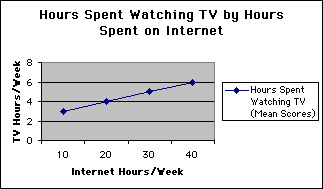Media Effects Research Lab - Research Archive
Does internet displace traditional media usage?
Student Researcher(s)
Ryan Misuro ( Candidate);
Chris Stec ( Candidate);
Jennifer A.Thomas ( Candidate);
William F. Yurasko ( Candidate);
Faculty Supervisor
INTRODUCTION
The advent of new technology has contributed to increasing changes in consumers' media usage and preferences. Traditional media may lose their potency and be overtaken by newer media. For example, television assumed the mantle of most dominant medium from radio. This is in keeping with displacement theory which predicts that one medium will be overtaken, or displaced, by another medium. With the ubiquitous rise of the internet, it is felt that it might displace other traditional media, particularly television.
HYPOTHESIS
Based on displacement theory, it is hypothesized that the internet will displace other traditional media, particularly television.
METHOD
A total of one hundred and twenty respondents were selected from a systematic random sample. Each respondent was given a survey which had items pertaining to usage and availability of different media, including the internet and television.
RESULTS
Since the main focus of this study was to examine the potential displacement effects that the internet has on television, the variable "Net Hours" (which represented the total number of hours each individual subject spent on the internet over one week) was plotted against another variable "TV Hours" (which represented the total hours each subject spent watching television). Contrary to the hypothesis, the results indicate a positive correlation between these two variables, indicating that the more time a person spent on the internet, the more likely he/she was to watch television. Analysis of other data indicate that respondents tend not to regard the internet as an exclusive medium but rather as another choice to television. It was also seen that those respondents who have a strong affinity towards television are less likely to have that media displaced in their lives by the internet.

CONCLUSIONS
Though the hypothesis was not supported, the correlations indicate that with increasing television viewing, there is also an increase in internet usage. This might be because loneliness or depression may lead to both higher television viewing as well as higher internet usage. It might also be that people with lesser social skills may prefer to spend more time with television and the internet. That is to say, individual or environmental factors unrelated to media may play a role in determining usage of both media instead of distinguishing between them.
For more details regarding the study contact
Dr. S. Shyam Sundar by e-mail at sss12@psu.edu or by telephone at (814) 865-2173

